The Six Knights: The Prince's Bodyguard
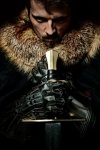 Sir Praxis -- Lord of Worcester Sir Praxis -- Lord of Worcester
|
 Sir Sine Qua Non -- Lord of New Bedford Sir Sine Qua Non -- Lord of New Bedford
|
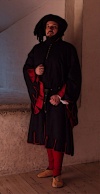 Sir Pro Bono -- Lord of Gloucester Sir Pro Bono -- Lord of Gloucester
|
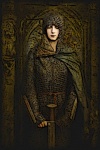 Sir Sine Die -- Lord of Lowell Sir Sine Die -- Lord of Lowell
|
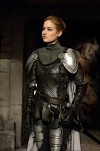 Sir Cum Laude -- Lady Seneschal of Boston Sir Cum Laude -- Lady Seneschal of Boston
|
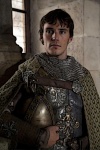 Sir Probus -- Lord of Quincy Sir Probus -- Lord of Quincy
|
Institutionalized for various severe mental illnesses long before being Embraced, these three men, two women and a teenage boy found a precarious stability in each other. Until they met at Bridgewater State Asylum, each had suffered from some form of catatonia or solitary delusion. They soon became fast companions, sharing a delusory medieval world of dragons, kings and sorcerers which, by the mad workings of their unbalanced minds, they created together.
Although this group delusion was a deeper and more complex problem than had previously existed, it at least gave them a limited ability to interact with the real world. They saw their doctors as monks, and Bridgewater as a monastery where they were knights recovering from a bloody quest.
One evening, a black knight came to the monastery and ensorcelled them -- at least, that is how they viewed their Embrace. The knight, who called himself Skarvan, took them far from the monastery. They traveled on enchanted steeds to New York City. There, the knight showed them their new castle -- an abandoned shack outside the city -- which, as his squires, they were to defend at all costs.
Every night they would rise from their earthen beds and watch the black knight ride out to prepare the "Dragonfeast" -- the kidnapping, murder and exsanguination of a mortal. The knight would return with a beast and its spawn (several mortals) that he had killed in "deadly combat," and then feed the neonate squires their blood.
At first the Six were content with this way of life. Their lord provided for their needs and they in turn guarded his demesnes -- with their unlives should the occasion arise. Gradually, however, they became disenchanted. No longer did they wish to remain squires, for the time had come to prove themselves in combat and become knights. Yet the black knight would permit no such thing. They were to remain at the castle and defend their sire.
Then came the fateful night when Sir Skarvan did not return from his customary beast hunt. The Six waited, but they were not to indulge in the "Dragonfeast" that evening, or the next. Three evenings later, one of the Six suggest that they quest for the missing knight, and that perhaps on the way they would find adventure.
Their search, which extended no further than a neighboring town, was fruitless, and they determined that while they awaited the knight's return, they would practice the lordly skill of beast-killing. The Six survived in this manner until one evening, weeks later, Sir Skarvan, the black knight, returned on his magnificent black stallion. With him were a small child and a man of noble bearing and royal features, both bound and gagged.
The Six withdrew into the shadows of the castle as the black knight thundered into the dining hall, pushing the man and child off his horse. Leaving them bound on the cobblestones, the knight dismounted, strode to the back of the hall and, with great magic (a shovel), created a deep well that reached unto the core of the earth. Then he returned to the man, None of the Six had seen such a king before, and all were curious as to why the noble had been tied and gagged. The answer soon became clear: the black knight meant to ensorcell the noble and make him his squire.
None of the Six approved: this noble was obviously the knight's better, and already Sir Skarvan had six squires, five more than than all the other knights in the land. With the realization that the knight had little honor and much greed, part of the ensorcellment began to dissolve. Now the Six saw themselves as slaves of Sir Skarvan and, more importantly, knew that the noble lying on the cobblestones was a king, a lord of such might that he could dispel Sir Skarvan's evil enchantments.